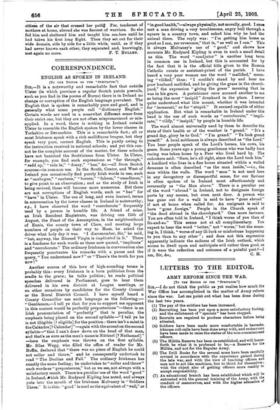LETTERS TO THE EDITOR.
ARMY REFORM SINCE THE WAR.
[To THY EDITOR 07 THE "SPECTATOR:1
Sra,—I do not think the public as yet realise how much the War Office has accomplished in the matter of Army reform since the war. Let me point out what has been done during the last two years.
(1) The pay of the soldiers has been increased.
(2) Recruiting has been put upon a more satisfactory footing, and the enlistment of " specials" has been stopped.
(3) Recruits are required to produce characters before being attested.
Soldiers have been made more comfortable in barracks, irksome roll-calls have been done away with, and endeavours have been made to raise the status of the non-commissioned officers.
(5) The Militia Reserve has been re-established, and will hence- forth be what it is professed to be,—a Reserve for the Militia, and not for the Regular Army.
(6) The Drill Books for the several arms have been carefully revised in accordance with the experience gained during the late war, and with the view of teaching officers and men not to act like machines, but to think for themselves ; with the object also of getting officers more readily to accept responsibility. (7) An educational branch has been established which will be entrusted with the general training of the Army, with the conduct of manoeuvres, and with the higher education of the officers.
(4)
(8) The Royal Military College at Sandhurst has been prac- tically reorganised as regards interior economy, discipline, and the training of the cadets.
(9) Candidates for the cavalry and Guards will no longer be admitted into the Service under a lower standard of examination than that required for the infantry of the Line.
(10) Careful inquiries have been made as to the expenses of living in the Army, and while the State has undertaken to provide chargers for mounted officers, furniture for barrack rooms, plate, glass, and crockery for messes, at a small annual charge, commanding officers will be held responsible that the style of living, subscriptions to regimental funds, &c., do not necessitate officers incurring heavier expenses than can be defrayed from a very moderate addition to their pay. These arrangements will, it is hoped, enable more men possessed of brains but with very little private means to enter the Service than has hitherto been possible.
(11) The necessary cost of officers' uniforms has been considerably reduced, as a good deal of gold lace has been done away with, and a plain, serviceable undress uniform has been provided, to be worn both in peace and war. I say " ought " because the cost of uniforms is really a matter to be settled between the officers and their tailors.
(12) Arrangements have been made by which the number of men to be trained as mounted infantry will be considerably increased.
(13) The Yeomanry, instead of being few in numbers, and In- different cavalry, are rapidly approaching the respectable figure of thirty-five thousand, and are being trained as mounted infantry, a service for which they are well suited.
(14) The lance as a weapon for war has been done away with, and the cavalry will henceforth be taught to use the sword more skilfully, and to understand that the rifle is the weapon on which they must chiefly depend. The lance, as an arms blanche, was a fine weapon, but it is incompatible with the use of the rifle and with dismounted work generally.
(15) As the carbine is practically useless against long-ranging weapons, a shortened and somewhat lighter rifle than the Lee-Metford has been decided upon. The cavalry will be armed with this rifle in the first instance, and as it is in all respects as effective as the Lee-Metford, the infantry will be gradually provided with it.
(i6) The canteen system has been carefully gone into, and orders as to the future management of canteens will shortly be issued.
A Department that can show such a record as this is surely not to be regarded as unworthy of the confidence of the nation. It is best, however, to leave the statement as it stands, and merely to ask all fair-minded men to consider the matter on [We admit that the above list is a very striking one, and that in criticising the War Office these reforms should not be forgotten. Whether our system is sound as a whole and gives us the Army that we need is another matter. All that we are concerned with on the present occasion is to admit that the War Office, working on the lines it has adopted, has done a great deal to increase the efficiency of the Service.—En. Spectator.]



























































 Previous page
Previous page